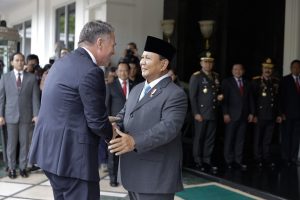Indonesia and Australia are preparing to open a new chapter in their diplomatic relations. Shortly after the general election in Indonesia in February, the winner of the election, Defense Minister Prabowo Subianto, met with Australia’s Defense Minister Richard Marles in Jakarta. During the meeting, the two leaders agreed to strengthen cooperation in the defense sector and announced plans to sign and implement a Defense Cooperation Agreement (DCA) in the near future.
Although the two ministers did not elaborate on what the DCA would include, the scope of cooperation is expected to be similar to the Framework for Security Cooperation and its Plan of Action on Defense Cooperation signed in 2021. The framework discusses, among other things, defense policy, inter-agency engagement, counter-terrorism, maritime security, humanitarian assistance and disaster relief, military logistics support, medical services, peacekeeping, intelligence, defense industry cooperation, and education and training.
The DCA between Indonesia and Australia will be a special gift for the two countries as they commemorate 75 years of diplomatic relations later this year. Indonesia’s relationship with Australia has experienced ups and downs over time. The two countries experienced tensions during the administration of Prime Minister Tony Abbott, after it was revealed that Australia had wiretapped the telephone conversations of President Susilo Bambang Yudhoyono, the first lady, Kristiani Herawati, and several senior Indonesian officials. In 2017, Indonesia also temporarily suspended all military cooperation activities with Australia due to “offensive training materials” produced by the Australian Army.
However, the Australian government has made considerable efforts to improve diplomatic relations with Indonesia since President Joko “Jokowi” Widodo took office in 2014, and seems set to continue doing so under the incoming Prabowo Subianto administration. Indonesia largely concurs, believing that the two “middle powers” can benefit from a closer partnership. For example, in the economic sector, the Indonesia-Australia Comprehensive Economic Partnership Agreement (IA-CEPA) has been in effect for both countries since 2020. In the maritime sector, the Indonesia Coast Guard and the Australia Border Force have intensified their collaboration in the marine security and safety sector.
The same applies to the military sector. Indonesia lists Australia as a “first priority” country, categorizing it as a comprehensive strategic partner under the 2019-2024 Indonesian Military Diplomacy Blueprint. Among the other “first priority” countries are the ASEAN member states, countries with direct borders with Indonesia such as Palau and Papua New Guinea. India is also categorized as a first-priority country.
Subsequently, military exercises between Indonesia and Australia are also getting more extensive. For example, Super Garuda Shield, the joint military exercise hosted by Indonesia, is routinely participated in by Australia. Furthermore, Australia also recently granted 15 Bushmaster Protected Mobility Vehicles combat vehicles to support Indonesia’s involvement in United Nations Peacekeeping Operations.
It is predicted that the DCA is currently being negotiated to incorporate each country’s national interests. In this respect, Indonesia should take the opportunity to clarify its position on the AUKUS security partnership between Australia, the United Kingdom, and the United States. AUKUS itself has a goal to develop a fleet of nuclear-powered submarines, known as SSN-AUKUS, to strengthen the Royal Australian Navy, the first of which are planned to be ready for operation in the early 2040s.
When AUKUS first launched in 2021, Indonesia’s Ministry of Foreign Affairs issued a statement questioning the arrangement and expressing concerns about the aims and objectives of AUKUS, considering that Australia’s use and development of nuclear technology could have a negative impact on Indonesia. However, as time went by, the government softened its stance, with Jokowi stating recently that AUKUS should be seen as a partner of Indonesia, not a competitor.
The defense agreement will offer Indonesia an opportunity to reaffirm its stance on AUKUS, both individually and as an ASEAN member state. Given that Australia shares a maritime border with Southeast Asia, Indonesia needs to urge it to respect ASEAN countries that agreed and signed the Southeast Asia Nuclear Weapon-Free Zone treaty.
Unlike conventional diesel-powered submarines, despite having more advanced specifications such as longer submerge endurance capability, nuclear-powered submarines are potentially risky due to the radioactive contamination that can be released in the event of an accident. A fatal nuclear-powered submarine accident will definitely have a direct impact on Indonesia as well as other countries in the region by polluting marine ecosystems.
Indonesia needs to seriously question the manufacturing process of SSN-AUKUS and the ecological impacts that may arise. In addition, prohibiting SSN-AUKUS boats from entering Indonesian waters when they are delivered will also be essential for upholding Indonesia’s sovereignty.
The DCA also offers opportunities for Indonesia to deepen defense industry cooperation and increase the capabilities of its domestic defense industry. For instance, PT PAL, Indonesia’s state-owned shipbuilder, can stand to learn from the Australian shipbuilder AUSTAL, which is among the world’s 100 largest defense companies, and improve the quality of its own manufacturing processes.
The DCA with Australia shapes the perfect platform for Indonesia to concretely contribute to ASEAN solidarity and de-escalate conflicts in the region. Given the amicable relations between the two countries, which are well established and only projected to strengthen, despite areas of continuing disagreement, it would be wise for the DCA discussions to be held in a transparent manner and accommodate the national interests of each country.

































